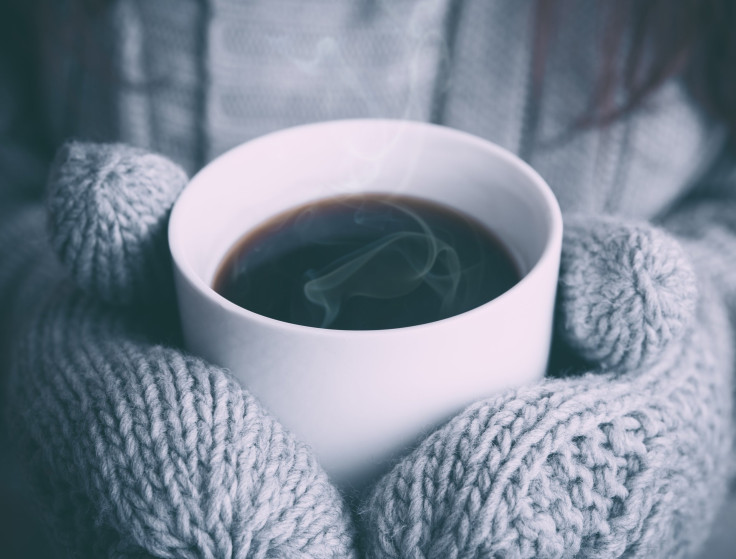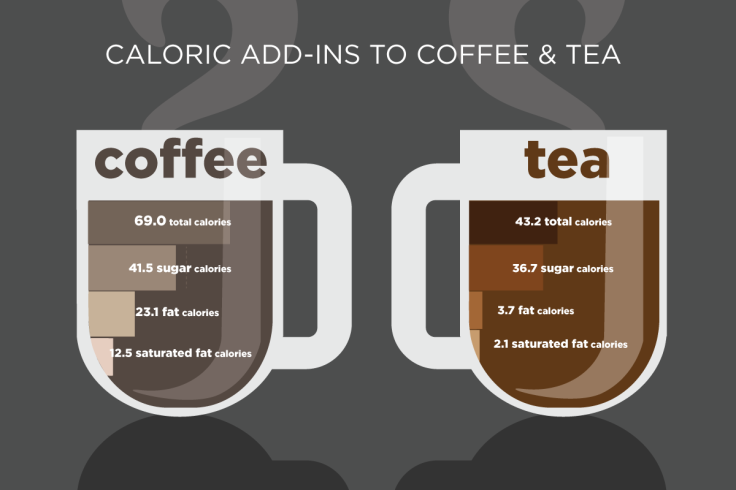5 Healthy Ways To Have Caffeine: Extra Calories In Coffee And Tea Can Cause Weight Gain

Most of us start our day the same way — with a cup of coffee or tea. Whether we prefer an extra shot of caffeine, a pump of syrup, or cream and sugar, our morning beverage contains more (unhealthy) calories that could cause weight gain. A recent study published in Public Health has found that these calorie-rich additives could have serious implications for our waistlines and overall health.
"Many people prefer drinking coffee and tea with sugar, cream, half-and-half or honey," said Ruopeng An, study author and a kinesiology and community health professor at the University of Illinois, in a statement. "These add-in items are often dense in energy and fat but low in nutritional value."
Read More: Health Benefits Of Coffee vs. Tea
In the United States, on any given day, more than 51 percent of adults drink coffee, and close to 26 percent drink tea, with sugar or cream being the most popular add-ins. An found an overwhelming two-thirds of coffee drinkers and one-third of tea drinkers put sugar, cream, flavorings, and other calorie-laden additives in their drinks. Drinking calorie-heavy coffee and tea on a regular basis may influence our daily energy/nutrient intake and diet quality.
A small dose of sugar isn't harmful, but if we're drinking several cups of coffee per day, these empty calories can add up. For example, putting two teaspoons of sugar in three cups of caffeine will total 48 grams of sugar. Sugar-sweetened beverages are among the biggest sources of added sugar in the American diet, accounting for more than one-third of the added sugar we consume as a country.
Unsurprisingly, a sugar-laden diet has been found to raise the risk of dying from heart disease, even if we're not overweight.
With this in mind, An and his colleague sought to examine how many extra calories we consume from add-ins, and their relation to energy, sugar, and fat intake among U.S. adults. The researchers looked at 12 years of data, concluded in 2012, from the National Health and Nutrition Examination Survey, which included 13,185 adults who reported drinking coffee and 6,215 adults who reported drinking tea in the 24 hours prior to being surveyed.
Coffee drinkers consumed the most extra calories, or 69 total per day, on average. More than 60 percent of these calories came from sugar, with fat accounting for most of the extra calories. In comparison, tea drinkers fared better with caloric add-ins adding 43 extra calories with about 85 percent of these calories coming from sugar.

Although the daily intake may seem small, An warns the extra calories every day can add up to extra pounds.
Read More: Caffeine From Tea And Coffee Lowers Blood Pressure
"Our findings indicate that a lot of coffee and tea drinkers regularly use caloric add-ins to improve the flavor of their beverages, but possibly without fully realizing or taking into consideration its caloric and nutritional implications," he said.
The Journal Of The American Dietetic Association previously found non-alcoholic beverages account for about one quarter of our calorie intake and half of all our added sugar. Gourmet drinks like lattes are filled with huge amounts of calories and fat, with some having the same number of calories as a small meal.
Realistically, we're not ready to give up coffee or tea, but there are healthier ways to consume these popular drinks. Focusing on how to cut calories from what we drink can make a difference in the scale, and overall health. The Centers for Disease Control and Prevention have cautioned to rethink our drink the next time we have caffeine with these five simple tips:
Skip The Extra Flavoring
Flavor syrups used in coffee shops, like vanilla or hazelnut, are sugar-ladened, and will add the extra calories to our drink. For example, Torani brand flavored syrups can contain as many as 80 grams of sugar in two tablespoons. Choosing sugar-free syrups or using extracts, like vanilla can help cut the extra calories.
Skip The Whip
The whipped cream on coffee drinks can add unnecessary calories and fat. A single tablespoon of whipping cream contains more than 50 calories; 3.4 grams are saturated fat, which can be harmful to our heart health. At home, we can blend skim milk with a couple of ice cubes in the blender, and add a drop or two of vanilla extract to get a touch of flavor.
Stick To The Basics
Order a plain cup of coffee with fat-free milk and an artificial sweetener; the same applies to tea. Simply drinking coffee black will also reduce calorie intake. A plain cup of brewed coffee has only 2 calories, and most importantly no fat.
The 1 Percent Rule
Choose fat-free or low-fat milk instead of whole milk. A tablespoon of whole milk comes in at 9 calories; 48 percent fat, 29 percent carbs, and 23 percent protein. However, milk-based drinks like lattes contain plenty of dairy, which adds up.
Less Is More
It may be tempting to get the next size up for a few cents more, but the bigger the drink, the higher the calories. Ordering the smallest size available will help curb our calorie and caffeine intake. For example, a medium sweetened iced coffee at Starbucks comes in at 80 calories; a small contains 60 calories.
Source: An R and Shi Y. Consumption of coffee and tea with add-ins in relation to daily energy, sugar, and fat intake in US adults, 2001–2012. Public Health. 2017.
See Also:
Drinking Coffee In Moderate Amounts May Protect Your Brain From Cognitive Impairment, Alzheimer's



























